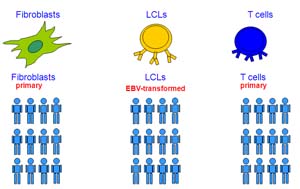Genetic variations produce different effects, depending on the tissue

A collaboration between researchers at the Wellcome Trust Sanger Institute in the United Kingdom and the Faculty of medicine of the University of Geneva has demonstrated how DNA variation that controls and regulates the gene activity acts predominantly in a tissue-specific manner. In approximately 4 out of 5 cases, genetic variations will produce different effects depending on the tissue investigated. The results of this study are published today, July 31, in the prestigious journal Science.
A fundamental question in current biomedical research is to unravel the function of the human genome, this enormous information text that contains approximately 21000 genes. More precisely, scientists search for what regulates the activity of each one of these genes in different cell/tissues of the body, and in different stages of the lifetime of each individual. Genetic variants (mutations), within DNA, can alter the way gene expression is controlled and leads to different levels of expression/gene activity between humans. Genetic variation in regions of the genome that control gene activity are very likely to have consequences in disease and have been shown to predispose to a number of common diseases in human populations.
Understanding how the human genome works
The laboratories of Professor Emmanouil Dermitzakis, until recently at the Wellcome Trust Sanger Institute (UK), and presently at the University of Geneva and Professor Stylianos Antonarakis at the University of Geneva have used state-of-the-art sophisticated genetic analysis to pinpoint regions of the genome where DNA variation affects the activity levels of a large number of genes. Surprisingly this phenomenon is tissue specific. The laboratories, both of which are now based within the Department of Genetic Medicine and Development of the Faculty of medicine, used a biobank of different cell types, unique in the world, called GENCORD, collected at the Division of Genetics at the University Hospitals of Geneva after approval from the ethics committees for medical research, and hundreds of thousands of genetic markers throughout the genome.
Implications for medicine
The research undertaken by these groups has highlighted that when a mutation (SNP) exists in the DNA of an individual, it may affect the gene activity in one group of tissues but not another.
“It’s fascinating how the identical DNA sequence can influence the expression of a gene in one cell type, but not in another. Integrating expression studies with disease association studies is very exciting, but pre-determining which cell type is relevant for a disease may not be straightforward in all cases. For example we expected to find extensive sharing of regulatory variation between B-cells and T-cells, both blood cell types, but as it turns out these cell types are as different to each other as each one of them is to fibroblasts.”
Antigone Dimas A PhD student at the Wellcome Trust Sanger Institute
“What is apparent now is that functional consequences of DNA variants affecting regulation of genes follows complex rules, and the elucidation of their effect will require large-scale international efforts and such efforts are fortunately under way.”
Professor Emmanouil Dermitzakis Until recently at the Wellcome Trust Sanger Institute (UK), and presently at the University of Geneva
This tissue-specific behaviour of genetic effects may explain the large diversity in diseases and the tissue specificity of most of them. Some genetic variants predispose people to certain common disease such as diabetes and cardiovascular disease. We can now statistically infer which variants these are but we know very little about their effect in the cell.
“The results of this study point to the direction we need to follow in order to understand the tissue specificity of biological effects of disease mutations, and thus understand where to target our treatments.”
Professor Stylianos Antonarakis at the University of Geneva
Though the mutation is present in all cells of an organism, only one or a few of the tissues can be affected. Furthermore, this study highlights the need to investigate the function of such variants in the context of the tissue relevant to the disease. Its results are being published online July 31 in the journal Science.
More information
Funding
This project has been funded by the Wellcome Trust, the US National Institute of Health (NIH), the EU project AnEUploidy and the Swiss National Science Foundation (SNSF).
Participating Centres
- Wellcome Trust Sanger Institute, Wellcome Trust Genome Campus, Cambridge, UK
- Department of Genetic Medicine and Development, University of Geneva Medical School, Geneva, Switzerland
- Division of Genetics, Department of Medicine, Harvard Medical School and Brigham and Women’s Hospital, Boston, MA, USA
Publications:
Selected websites
The Wellcome Trust Sanger Institute
The Wellcome Trust Sanger Institute, which receives the majority of its funding from the Wellcome Trust, was founded in 1992. The Institute is responsible for the completion of the sequence of approximately one-third of the human genome as well as genomes of model organisms and more than 90 pathogen genomes. In October 2006, new funding was awarded by the Wellcome Trust to exploit the wealth of genome data now available to answer important questions about health and disease.
The Wellcome Trust
The Wellcome Trust is a global charitable foundation dedicated to achieving extraordinary improvements in human and animal health. We support the brightest minds in biomedical research and the medical humanities. Our breadth of support includes public engagement, education and the application of research to improve health. We are independent of both political and commercial interests.


